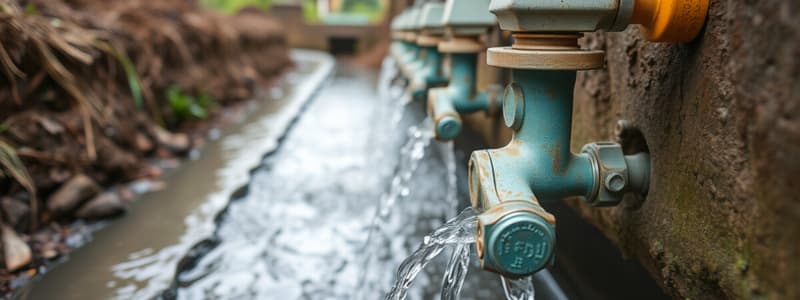Podcast
Questions and Answers
What is the primary purpose of tariff design in a public utility water supply system?
What is the primary purpose of tariff design in a public utility water supply system?
- To analyze soil conditions for foundation design
- To determine the location of water sources
- To reduce the overall demand for water
- To assign a price for water supplied to customers (correct)
Which document summarizes the design standards and special provisions for a water supply project?
Which document summarizes the design standards and special provisions for a water supply project?
- Bill of Quantities
- General Layout
- Detailed Plans
- Engineer's Report (correct)
What are detailed plans in the context of water supply planning?
What are detailed plans in the context of water supply planning?
- Specifications of material quality
- A summary of the project costs
- General layouts showing major facilities
- Blueprints or working drawings (correct)
What is the primary focus of demand-based design in the water supply sector?
What is the primary focus of demand-based design in the water supply sector?
At what temperature is water most dense?
At what temperature is water most dense?
What form does water primarily take in the atmosphere?
What form does water primarily take in the atmosphere?
Which of the following is NOT emphasized as a consideration for a sustainable water system?
Which of the following is NOT emphasized as a consideration for a sustainable water system?
Which element is NOT included in the detailed plans for a water supply system?
Which element is NOT included in the detailed plans for a water supply system?
In the context of water supply, what does operational autonomy refer to?
In the context of water supply, what does operational autonomy refer to?
What is the bill of quantities used for in water supply projects?
What is the bill of quantities used for in water supply projects?
What factor is primarily considered in tariff design within the water supply framework?
What factor is primarily considered in tariff design within the water supply framework?
Which step in the water system design process involves consultation among stakeholders?
Which step in the water system design process involves consultation among stakeholders?
What is one of the primary uses of water in domestic settings?
What is one of the primary uses of water in domestic settings?
Which of the following best describes the importance of a monitoring system in water utilities?
Which of the following best describes the importance of a monitoring system in water utilities?
What does phased design in water system planning entail?
What does phased design in water system planning entail?
Which consideration ensures that the community supports the water supply project?
Which consideration ensures that the community supports the water supply project?
Study Notes
Philippine Water Sector Overview
- Demand-Based Design focuses on consumer preferences and willingness to pay for water services.
- Phased Design involves implementing the water supply system according to a master plan in stages.
- Updated Technology adoption enhances planning and operation efficiency in water utilities.
- Operational Autonomy allows independent management of water supply networks.
- Tariff Design is a full-recovery model mandated for all utilities, ensuring sustainable financing.
- Institutional Development requires Water Districts to follow commercial practices and guidelines set by the LWUA.
- Monitoring Systems are in place, requiring annual reporting to maintain accountability.
Sustainable Water Supply System Considerations
- Technical Considerations emphasize correct design and construction using appropriate technologies and materials.
- Financial Considerations prioritize minimizing costs while meeting operational standards and customer needs.
- Social Considerations highlight the importance of community engagement for budget support and project initiation.
- Environmental Considerations ensure that water sources remain protected from adverse developments.
Water System Design Process
- Service Level decisions must be based on stakeholder consultations to address community needs.
- Water Demand Projections require projecting population growth and water consumption over time for appropriate facilities planning.
- Facilities Decisions involve establishing guidelines for designing components of small water systems.
- Capital Investment and O&M (Operation and Maintenance) Costs are estimated based on proposed system details and water sources.
- Tariff Design involves setting a price for water supplied through public utilities, reflecting operational costs.
- Design Iteration ensures proposed facilities meet social criteria, including affordability and community acceptance.
- Plans and Design Specifications are prepared by engineers to create detailed construction guides for a balanced water system.
Design Outputs
- Engineer’s Report summarizes key design standards and special provisions, including demand requirements and treatment processes.
- General Layout provides an overview of the water supply network and key facilities within a specific area.
- Detailed Plans, or blueprints, serve as comprehensive working drawings for construction.
- Specifications outline material types, installation procedures, and quality standards for the construction process.
- Bill of Quantities and Cost Estimates serve as a basis for bidding and financial planning for projects.
Nature and Importance of Water
- Water covers 70% of Earth's surface and exists in vapor form in the atmosphere.
- Pure water is tasteless, odorless, and colorless; it is most dense at 4 degrees Celsius.
- One liter of water at 4 degrees Celsius weighs 1 kilogram, a key reference for physical properties.
Uses of Water
- Domestic Use encompasses residential water needs, including drinking, cooking, and sanitation.
- Other Uses involve industrial, agricultural, recreational, and ecological functions of water resources.
Hydrologic Cycle
- Water in the Atmosphere exists as vapor due to evaporation from various water bodies.
- Most water falls back as precipitation either into oceans or land, creating surface runoff.
- Water in the Earth includes both surface runoff and groundwater infiltration, crucial for maintaining ecosystems.
Studying That Suits You
Use AI to generate personalized quizzes and flashcards to suit your learning preferences.
Description
Explore the key concepts of water supply management in the Philippines, focusing on demand-based design, phased design, and the application of new technologies. This quiz will enhance your understanding of how water utilities operate effectively while addressing consumer needs and incorporating operational autonomy.




